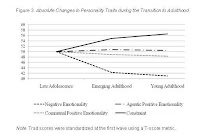"Personality trait change in adulthood." Current Directions in Psychological Science, 17, 31-35. Roberts, B. W. & Mroczek, D. (2008).

shows personality traits are highly stable in persons over 25 years old to 45 years old.
(the group of persons who could be most interested in serious online dating)
now a new paper is replicating that finding.
"Genetic and environmental influences on personality trait stability and growth during the transition to adulthood: A three wave longitudinal study. "
Journal of Personality and Social Psychology. (2010)
Hopwood, C.J., Donnellan, M.B., Blonigen, D.M., Krueger, R.F., McGue, M., Iacono, W.G., & Burt, S.A. (in press).

http://psychology.msu.edu/Faculty/FacultyMember.aspx?netid=donnel59
Abstract
During the transition to adulthood individuals typically settle into adult roles in love and work. This transition also involves significant changes in personality traits that are generally in the direction of greater maturity and increased stability.
Competing hypotheses have been offered to account for these personality changes: the intrinsic maturation hypothesis suggests that change trajectories are endogenous, whereas the life-course hypothesis suggests that these changes occur because of transactions with the social environment. This study investigated the patterns and origins of personality trait changes from ages 17 to 29 using 3 waves of Multidimensional Personality Questionnaire data provided by twins.
Results suggest that
a) trait changes were more profound in the first relative to the second half of the transition to adulthood;
b) traits tend to become more stable during the second half of this transition, with all the traits yielding retest correlations between .74 and .78;
c) negative affectivity declined over time and constraint increased over time; minimal change was observed on agentic or communal aspects of positive affectivity;
and
d) both genetic and non-shared environmental factors accounted for personality changes.
Overall, these genetically-informed results support a life-course perspective on personality development during the transition to adulthood.
The transition to adulthood between the ages of 18 and 30 involves significant psychological development with regard to intimacy, identity, work, and parenthood. These changes are also accompanied by both stability and change in personality traits. However, debates exist regarding whether exogenous or endogenous factors are more responsible for personality development during this period of the lifespan. Accordingly, the goal of this study was to evaluate genetic and environmental influences on personality stability and change during the transition to adulthood using three waves of personality trait data. Specifically, we examined the etiological influences on stability and change in the higher order personality traits of the Multidimensional Personality Questionnaire (MPQ; Tellegen & Waller, 2008) using a sample of twins assessed in late adolescence (approximately age 17), emerging adulthood (approximately age 24), and young adulthood (approximately age 29).
Participants were same-sex male and female monozygotic (MZ) and dizygotic (DZ) twins from the Minnesota Twin Family Study (MTFS), which is a population-based sample of reared-together twins (Iacono & McGue, 2002).
This study used MPQ data from a cohort born between 1972 and 1979 who were identified in Minnesota public birth records and recruited to participate at approximately 17 years of age (range = 16-18 years).
At baseline there were 626 complete pairs of twins (Women nMZ = 223, nDZ = 114; Men nMZ = 188, nDZ = 101).
Twins were reassessed at the average ages of 24 and 29.
-----------
If you are an executive in the Online Dating Industry, be aware of these findings. The Online Dating Industry for serious daters can not ignore Scientific Research any more.
[I had also suggested consider to synchronize with menstrual cycle of women not taking contraceptive pill and biorhythms for women, and biorhythms in men when Researchers assess personality, in test & retest.
because
"Human oestrus" Gangestad & Thornhill (2008)
"Does the contraceptive pill alter mate choice in humans?" Alvergne & Lummaa (2009)
show only short-term but not long-term partner preferences tend to vary with the menstrual cycle.]
No comments:
Post a Comment